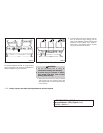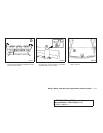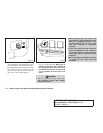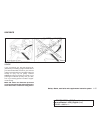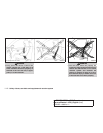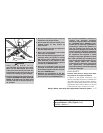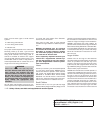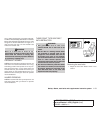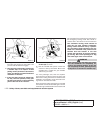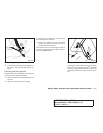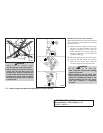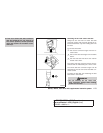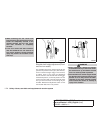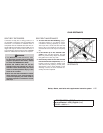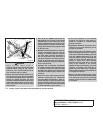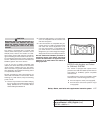
᭺
2
Slowly pull the seat belt out of the retractor
and insert the tongue into the buckle until
you hear and feel the latch engage.
● The retractor is designed to lock during
a sudden stop or on impact. A slow
pulling motion permits the seat belt to
move, and allows you some freedom of
movement in the seat.
● If the seat belt cannot be pulled from
its fully retracted position, firmly pull
the belt and release it. Then smoothly
pull the belt out of the retractor.
᭺
3
Position the lap belt portion low and snug
on the hips as shown.
᭺
4
Pull the shoulder belt portion toward the
retractor to take up extra slack. Be sure the
shoulder belt is routed over your shoulder
and across your chest.
The front passenger seat, 2nd row captain’s
chairs and the rear bench seat three-point seat
belts have a locking mechanism for child restraint
installation. It is referred to as the automatic lock-
ing mode or child restraint mode.
When automatic locking mechanism is activated
the seat belt cannot be extended again until the
seat belt tongue is detached from the buckle and
fully retracted. Once retracted, the seat belt is in
the emergency locking mode. See “Child re-
straints” later in this section for more information.
The automatic locking mode should be
used only for child restraint installation.
During normal seat belt use by a passen-
ger, the locking mode should not be acti-
vated. If it is activated it may cause uncom-
fortable seat belt tension. It can also
change the operation of the front passen-
ger air bag. See “Front passenger air bag
and status light” later in this section.
WARNING
When fastening the seat belts, be certain
that the seatbacks are completely se-
cured in the latched position. If they are
not completely secured, passengers may
be injured in an accident or sudden stop.
WRS0137 WRS0138
1-20 Safety—Seats, seat belts and supplemental restraint system
੬ REVIEW COPY—
2007 Quest (van)
Owners Manual—USA_English (nna)
02/24/06—debbie
੭



